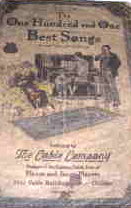 Passing by a front porch sale in my neighborhood this afternoon, I turned around my bike, stopped, and picked up (for a quarter) a little book called The One Hundred and One Best Songs. It is a songbook from 1922 published by The Cable Company of Chicago, “makers of the famous Cable line of pianos and inner-players.” I’m a sucker for books like this—collections of secular and religious songs that the whole family can sing and enjoy together. The real selling point for me, as usual, is the fine showing of songs by Stephen Foster, who, thanks to early childhood brainwashing by my dad, is one of my favorite composers. It even gives Foster’s words in their original minstrel-show racist glory: “Oh! darkies, how my heart grows weary,” and “Massa’s in de Cold, Cold Ground.”
Passing by a front porch sale in my neighborhood this afternoon, I turned around my bike, stopped, and picked up (for a quarter) a little book called The One Hundred and One Best Songs. It is a songbook from 1922 published by The Cable Company of Chicago, “makers of the famous Cable line of pianos and inner-players.” I’m a sucker for books like this—collections of secular and religious songs that the whole family can sing and enjoy together. The real selling point for me, as usual, is the fine showing of songs by Stephen Foster, who, thanks to early childhood brainwashing by my dad, is one of my favorite composers. It even gives Foster’s words in their original minstrel-show racist glory: “Oh! darkies, how my heart grows weary,” and “Massa’s in de Cold, Cold Ground.”
But despite the horrid memories that these words evoke, something else lurks at the bottom of most of the pages. There are little boxes with tiny text. Some mention the features and benefits of Cable pianos. Others simply offer moral, upbuilding quotations from notable people. It is as if righteousness were so appealing to the people of 1922 that there was no better way to attract their attention.
Take the box under “Massa’s in de Cold, Cold Ground,” a song written by a white man about slaves wailing over the death of the person who claimed to own them:
Courtesy is the eye which overlooks your friend’s broken gateway, but sees the rose which blossoms in his garden.
Today I had lunch with a friend sorely concerned about the direction of the social order and the family and so on. Afterward, looking around the city, it was hard to blame him. Especially as far as little things go, which hint toward things more troubling. Hearing guards at the magnificent 42nd Street library saying bad words nonchalantly to each other while checking the bags of tourists; similarly bad words scrawled along the pedestrian path on the Williamsburg Bridge, which always has families walking on it; a condom lying in the stairwell of my apartment building. When one turns off the blinders that one develops living in New York, these things really can add up. What kind of world are we creating? Certainly not one that says, as The Cable Company does:
Music washes away from the soul the dust of every-day life.
The beautiful is nothing else than the visible from of the good.—Plato.
Be not simply good—be good for something.—Thoreau.
Soldiers remember—”He that ruleth his spirit” is greater “than he that taketh a city.”—<em>Prov. 16: 32</em>.
These are fabulous. I could go on forever. There are many more. And of course, stuff like this is mixed in:
Economy in buying a piano consists in getting the best instrument that can be made for the price you pay. You expect to receive the full equivalent of your money. That principle is the basis of our selling policy.
Today, rather than upbuilding quotations, advertisers attract our attention with boobies and innuendos. (The demise of this form of advertising, which treats the buyer as a rational, essentially decent person and replaces “him” with a base, id-driven subconscious, is the subject of part one of Adam Curtis’s documentary The Century of the Self.) I am tempted to agree with my friend—the world has gone to, dare I say on what has always been a blog you can bring the whole family to, shit.
But every time I go back to my favorite Stephen Foster songs in there, I’ll remember, “Massa’s in de Cold, Cold Ground.” Those were days when, in this same country as mine, people couldn’t stand to share a drinking fountain. It is an odd kind of decency, a broken gateway that’s hard to ignore on the way to the blossoming rose.
Human societies seem to work this way. Where there’s righteousness, there’s a cruelty it ignores. And where there’s filth, at least we have music to wash our souls of it.